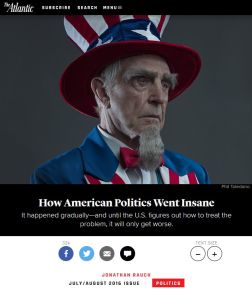
Jonathan Rauch
How American Politics Went Insane
The Atlantic, 2016
What's inside?
“Chaos syndrome” has led to the rise of “political sociopaths” in the United States.
Recommendation
Writing for The Atlantic, Brookings Institution senior fellow Jonathan Rauch examines the political environment that led to the rise of Donald Trump, Bernie Sanders and Ted Cruz. Rauch argues that “chaos syndrome” made it possible. He explores the political reforms that paved the way for the ongoing turmoil in Congress, a cynical public disgruntled with career politicians and “political sociopaths” running for president. While always politically neutral, getAbstract recommends this analysis to political junkies interested in the inner workings of the US Congress and US politics in general.
Take-Aways
- The US political system is broken.
- The rise of “political sociopaths” like Donald Trump, Bernie Sanders and Ted Cruz is a sign of a “chaos syndrome.”
- Traditionally, political middlemen instilled order in the political system, until reforms curbed their power.
- Without the middlemen, the Tea Party insurgency and “politiphobes” entered the system.
- The biggest challenge to restoring political balance is the public’s fascination with an “antiestablishment narrative.”
Summary
The US political system is broken; the rise of “political sociopaths” like Donald Trump, Bernie Sanders and Ted Cruz is evidence thereof. Their popularity isn’t a fluke, but a sign of a “chaos syndrome” – a self-reinforcing phenomenon causing governmental malfunction, fueling public outrage and leading to political disruption. To understand the breakdown, imagine the political system as an immune system; think of the US Constitution as the system’s DNA and the parties, machines and political brokers as the RNA. For the latter, middlemen – including state and national party committees, county party chairs, congressional subcommittees, political action committees and convention delegates – mediate among disorganized groups of politicians and voters. Although these middlemen aren’t always democratic, they instill order, encourage mutual accountability and discourage antisocial political behavior. However, progressives accused them of undermining the public interest, blocking the people’s will and expanding the government.
“Populism, individualism and a skeptical attitude toward politics are all healthy up to a point, but America has passed that point.”
To address these accusations, the people reformed the presidential nomination process and the Congress to include curtailing closed-door negotiations, reducing pork-barrel spending and tightening political donation regulations. These political reforms then left middlemen without the necessary tools to organize the political system: Populism became more important than mediation. With the political immune system compromised, two “viruses” attacked: the Tea Party insurgency and “politiphobes” – people who believe policy should come from “empathetic, non-self-interested decision makers.” Today, if Democrats and Republicans find something they can work on together, the promise of an extremist primary election with funding from outside coffers makes them think twice about working on bipartisan legislation.
“Donald Trump, Bernie Sanders and Ted Cruz have in common that they are political sociopaths – meaning not that they are crazy, but that they don’t care what other politicians think about their behavior and they don’t need to care.”
So how do you fix the system? There is no easy solution, but repealing restrictions that inhibit parties from coordinating with their candidates would be a good place to begin. Additionally, lifting restrictions on party donation limits and restoring congressional earmarks would give middlemen the power to do their job and lawmakers incentive to work together. The biggest challenge, however, is the public’s fascination with an “antiestablishment narrative.”
About the Author
Jonathan Rauch works as a contributing editor for The Atlantic and a senior fellow at the Brookings Institution.
This document is restricted to personal use only.
My Highlights
Did you like this summary?
Read the articleThis summary has been shared with you by getAbstract.
We find, rate and summarize relevant knowledge to help people make better decisions in business and in their private lives.
Already a customer? Log in here.





















Comment on this summary